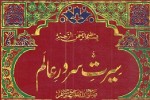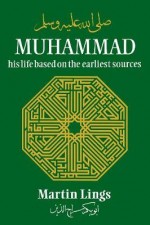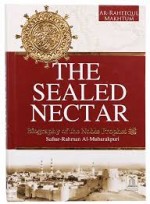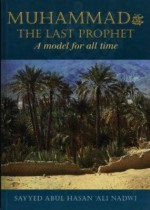
Prophetic Perspective of Jihad and the Doubts of the Modern Mind
-
Seerah
- at 21 September 2017
Dr. Mehmood Ahmad Ghazi
[There are many misconceptions and misunderstandings created by several non-Muslim scholars, orientalists and authors in their research works. One of the misconceptions which they constantly present is that the religion of Islam is a religion of terror and war and the aim of this religion is to engage its followers and others in the battlefield. This is absolutely a wrong concept about the Deen of Islam. In fact, Islam is the Deen (religion, way and system of life) of peace.
According to the teachings of the Noble Quran and the Sunnah of the Prophet Muhammad ï·º (peace be upon him), the international relations is peace, War as an essential element is an exceptional situation.
The author has analyzed in detail that terror has no place in the varying aspects of Jihad, and the deen of Islam is the deen of peace. Many people in the Muslim world have been affected by the behavior and thoughts of the Orientalists. They have taught that Islam’s objective is to perpetuate world war. This concept is wrong. Islam is the first message that has made the use of power a fruitful outcome and effectively bound to an ethical code. Because of the false impressions spread by the Orientalists, it is necessary to talk in detail on the concept of war and terror in Islam.]
From the time human beings have settled in this world of ours, they have consistently engaged in conflict. Perhaps there is not a single chapter of human history which does not mention conflict and war. There is not a single religion and civilization of the world which did not have dreadful examples of internal differences, battles, and wars. It is also a reality that, since the heavenly religion started, human beings have focused on learning to live with one another in harmony and goodwill.
There is not a single religious book of the world where efforts have not been made to regulate battles and wars and fights with a kind of ethics. Be it the Veda of Hinduism, famous epic poetry of Hinduism Ramayana and Mahabharata; or the philosophical and religious literature of old Greek era; efforts were made to bound powerful with laws, ethics, and principles. However, these moral codes were never followed practically, and even religious leaders themselves never felt ashamed of breaking ethical principles. The result was that bloodshed continued endlessly, and civilization and structure continued to be destroyed.
Gautama Buddha was strongly opposed to the use of any type of power. Similarly, the teachings of the Prophet Isa عليه السلام (Jesus) were presented as ideal pattern to the proud world by the intellectuals of the Christian World. But few of the followers of Mahatma Budha or of Jesus have ever followed these principles. Never has a Christian State been attacked and Christians have said that, as flag-bearers of love and affection, they would not fight. The same is the case of Buddhism. All the empires of followers of this religion established in Asia or any part of the world has a history absolutely no different from other nations in respect to war and bloodshed. It can be known from this that, in this practical world, these nations themselves are following the Islamic concept of war. They know that the use of power is based on the limitations and restrictions of law and ethics and therefore in itself is not bad. However, if its use transcends moral values and exceed the principles of law, then it is a disgusting thing. Human beings should make efforts so that the human society and civilization are saved from dreaded outcome and consequences of the unethical wars.
Shah Waliullah Muhaddith Dehlawi, speaking on the social need of Jihad, said:
“And that the best and practical system of the world is the one which has the concept of war and Jihad but is limited to the limitation of law and Shariah and is confined to restrictions of ethics and role.” (1)
Hence if a law or a system of Shariah does not have a clear and balanced concept of war and Jihad, then such a system is impracticable and cannot fulfill the real needs of any human society. How can a system be workable if basic human needs (inevitable wars and use of power) are not addressed? However, when study of Islam is done, it comes to light that Islam does not suffice just preaching and teaching, but it puts efforts into a positive and proactive manner for implementation of morals and ethics. It is obvious that for its implementation and reform, there is a need for active political and military power provided by Islamic state. However, despite the presence of this power, there arises a situation that external or internal powers try to fail this system or try to disrupt it, or efforts are made to destroy it due to some internal chaos. In this situation, the state, which itself is an enforcement power, has the responsibility of broadcasting and disseminating the message and practice of Islam. Its work is to foil disruptive attempts, to stop the internal and external powers, and to erase evil and chaos. It is the objective of the state to protect the message and to fight the external opponents or those spreading chaos internally. Steps taken in this context have been bestowed a comprehensive and unique topic of Jihad by Islam whose basic rules has been mention by the Quran and details has been mentioned by the Sunnah of Prophet Muhammad ï·º .
Islam does not preach to run away from the reality of the universe but to complete understanding and consciousness of these realities. It is the preaching of Islam that continuous efforts are made to improve the awareness of these realities. The understanding of these realities also includes the understanding of those powers who are flag-bearers of evil and who work against the good in the universe. The concept of good being good cannot come to mind until the human being has the understanding of evil. Hence Islam, since its inception, spoke of evil along with good. It mentions the power which drives the evil and also mentions the need of superior political and military power for the end and prevention of the powers of these evils and also gave orders for the success of these powers.
This crisis and work misery between good and evil, whether it is in the field of education or battlefield, Islam terms as Jihad. However, as the Jurists wrote:
وجوب الجهاد وجوب المسائل لالمقاصد(2)
“The necessity of jihad is the necessity of means, not for purposes.”
In other words, Jihad itself is not a goal, but simply a source to obtain the main objectives. There are some commands which are required, and there are some which become source of competition or existence of some other command. Jihad in itself is not required; however, as it is a source to achieve a goal, hence for this goal it is also required, and that goal is mentioned in the Holy Quran in this manner:
وقتلوهم Øتى لا تكون Ùتنة ويكون الدين لله (3)
“Keep on fighting against them until mischief ends and the way prescribed by Allah prevails” (02:193).
Jihad is a source to achieve a bigger objective, and that is:
وكلمة الله هى العليا (4)
“And Allah’s word is inherently uppermost” (09:40).
Allah’s Word should be high; freedom to take His name and Shariah of Allah be established. Any efforts taken in this step would be termed Jihad.
The Holy Quran in different places has given permission for the use of war and power. Islam has never accepted this concept that war originally is undesirable. In Islam’s view, power is a good thing provided it is used within religious and ethical limits. Use of power is correct if made as per moral code, and those using power and strength know the ethical restrictions and limitations of its use.
The word Jihad is used in the holy Quran in different meanings and connotations. Famous Imam of the Arabic Language, Allama Raghib Asfahani, has divided Jihad into three types:
He said that one struggle is that which is against an open enemy which means مجاهدة العدو الظاهر , fighting the enemy on the battle ground.
The second type of Jihad or struggle is مجاهدة النÙس, which is against the self esteem of the human being and the internal evil powers.
And the third type of Jihad is that which is against the offspring of Satan and the devil i.e. مجاهدة الشيطان (5)
Then its types are mentioned as per resources:
- One Struggle is that which a human being does with sword, which is the highest level of all this entire series of Jihad and is called Pinnacle (peak of the hump) of Islam; that means the exalted part of Islam and is the highest level of struggle.
- One struggle is that which a human being does through his knowledge.
- One struggle is that which a human being does through his wealth.
Hence, these are all forms of Jihad. Common thing in all these forms is that they have a common goal and help and assist each other. (6)
Among all these types of Jihad, coming to the battlefield with sword is the highest form of Jihad, which has been declared by Prophet Muhammad ï·º as desire of a Muslim’s heart.
Prophet Muhammad ï·º said:
"من مات ولم يغز, ولم ÙŠØدث به Ù†Ùسه, مات على شعبة من Ù†Ùاق" (7)
“He who died and did not fight a battle, and nothing happened to him, he died with a section of hypocrisy.”
Prophet Muhammad ï·º said for himself:
"ولوددت انى اقتل ÙÙŠ سبيل الله, ثم اØيا ثم اقتل, ثم اØيا ثم اقتل" (8)
“My heart wants that I am killed in the way of Allah in Jihad, and then I am made alive and then killed, then made alive and then killed.”
Martyrdom has a highest position, and this is such an honor that the wish of achieving it over and over again was made by Prophet Muhammad ï·º himself. Similarly, he said:
"لغدوة او روØØ© ÙÙŠ سبيل الله خير من الدنيا وماÙيها" (9)
“Going out in the way of Allah in the morning and evening is better than the world and whatever is in it.”
This is the concept of Jihad, which is there from day one with Muslims and till the time there is even a single Muslim in the world, this concept would remain:
"الجهاد ماض منذ بعثني الله الى ان يقاتل آخر امتى الدجال لايبطله جور جائر ولا عدل عادل" (10)
“Jihad is continuing from the day Allah has sent me as a messenger and will continue till the last person of my Ummah fights the Dajjal. Neither the brutality of a tyrant will end it nor the justice of an unbiased.”
The thing that is mentioned by Prophet Muhammad ï·º in the above quote is that there would be every type of rulers in the future, good and bad; however, Jihad would be headed by everyone. This clarification was needed so that if people said that a certain ruler is so corrupt and licentious and brutal that Jihad must end because a holy duty like Jihad cannot be done under such an unworthy ruler. Despite inefficiency of the rulers, Jihad would continue. It will not be impacted by the cruelty of a tyrant or lessen with the justice of a just ruler. In every condition, Jihad will continue because the goal and objectives of Jihad does not have anything temporary or permanent.
Prophet Muhammad ﷺ has declared Jihad as a distinctive feature of Islam and a high sharp point of the building of Islam because the success of the Muslims of the world is associated to this enthusiasm of Jihad. History is witness that, when Muslims continued with Jihad, they always met with success and when they parted way from it, humiliation and disgrace took its place. Hazrat Abu Bakr Siddique رضي الله عنه , in his first sermon after taking responsibility of caliphate, also mentioned that for the nation which leaves Jihad, Allah makes humiliation and disgrace its decrees.
Similarly, Hazrat Ali رضي الله عنه , in his first statement after taking the responsibility of the caliphate, also said that the nation which leaves Jihad gets humiliated in his house and in the country because the enemy takes advantage of its weakness and cowardness and enters the middle of its house, and in this way a Muslim himself becomes weak and humiliated in his own house and country. Due to this, the companions continued doing Jihad; followers did righteous of the community in every era, and every good and evil ruler did Jihad. There was every type of good and evil era in the history of Muslims, and in every type of rise and fall, the style of governance was affected. But neither the enthusiasm of Jihad changed nor the process of Jihad stopped in any era.
Prophet Muhammad ï·º emphasized the objectives of war and expressed that the objective of war is neither to expand nor to complete personal wish of an individual. The first and last objective of Jihad is only to complete Islamic preaching (dawah, outreach to people with the message of Islam) and to provide sources for it. If the sources of preaching are available, and there is no obstruction to it, there are no atrocities on Muslims, and in every place of the world they are free to live their lives as per religious requirements; in this scenario there is no need to take up sword. Prophet Muhammad ï·º said:
"لا تتمنوا لقاء العدو وسلوا الله العاÙية" (11)
“You yourself do not wish or desire for encounter with enemy; ask for safety from Allah (from all sorts of evil).”
Along with this, the lesson taken from the fighters of Prophet Muhammad ï·º , and different commands which he gave periodically is proof that, if conflict arises, the goal should not be to shed more blood of the enemies, but the goal should be that less of blood is shed and less loss of human life. Along with that, the power of the enemy is broken so that the power which had stood against Islam is not able to stand in the future and does not put any obstructions in the way of Islam.
This is the reason that whenever, Prophet Muhammad ﷺ, صلى الله عليه وسلم , got time to obtain the objectives of Islam without raising the sword, he avoided battle and completed his objectives without shedding blood. Allama Sarakhsi wrote:
"والمقصود لن يامن المسلمن Ùˆ يتمكنوا من القيام Ø¨Ù…ØµØ§Ù„Ø Ø¯ÙŠÙ†Ù‡Ù… Ùˆ دنياهم" (12)
“The destination and the objective of Jihad is that the Muslims should get peace and prosperity and are able to complete their religious and worldly objectives with peace.”
That means that Jihad is meant to achieve three types of objectives:
- Muslims and their fellow citizens live with peace and prosperity.
- The religious objectives of Muslims are being complied.
- Their religious interests are being complied.
If these three objectives are achieved without escalation of war, then war is illegal, and if any obstacle arises among these objectives, it is the responsibility of the Muslims and Islamic state to remove this obstacle. If it can be removed peacefully, it should be removed accordingly, and if the peaceful sources fail, then the swords should be raised. Jihad is collective duty and not individual duty. To achieve these objectives, the forms of battle, which are permissible, are divided into five types. No other forms apart from these five forms are allowed in which Muslims may raise swords.
The first verse, which we know, in which permission was given to wage war was in 2 A.H., and that is:
"اذن للذين يقتلون بانهم ظلموا" (13)
“Permission (to fight) has been granted to those against whom war has been waged because they have been treated unjustly, and Allah is certainly able to help them” (22:39).
It is clearly stated that when Muslims have been openly aggressed, then war is inevitable; hence, it has been permitted. Obviously, if every society, every regime, and every nation has the right to defend itself, the Muslims also have the right to defend themselves. The holy Quran has given its permission in many places. At one place, it says:
"Ùˆ قاتلوا ÙÙŠ سبيل الله الذين يقاتلونكم" (14)
“Fight against those who fight against you, in the way of Allah” (02:190).
It should be noted here that a simple war in defense confined with the rule of Allah’s way creates spiritual glory and ethical dimension in it. In this context, in another place it has been mentioned:
"Ùان العتدى عليكم Ùاعتدوا عليه بمثل ما اعتدى عليكم" (15)
“Thus, if someone has attacked you, attack him just as he attacked you” (02:194).
The second permissible form of war is to end any unrest, whether internal or created from outside; war that would be initiated to end it is called war of interests. If there is an internal coup against the state, if a group tries to confound the regime and wishes to scrap the community unity, then it is permitted to fight.
Third form is to wage war for the protection of Muslim minorities or for the protection of non-Muslims. Islamic jurists have termed protection of both as equally important. If there is a Muslim minority in an area, and the population of that area is facing atrocities, and the Muslim state has no regular agreement of friendship and peace with that country that would be violated in case war is waged, it is the responsibility of the Muslim state to protect the Muslim minorities and seek their freedom. War can also be waged on behalf of non-Muslims who have friendship agreement with the Muslim state.
In the third form of war, there may be cease-fires and then new battles for a specific goal. For example, in the war in Kashmir, no attacks take place for days and then one day they attack with full preparation. This repeats, and the intervening period would not be considered a state of peace. The reasons for war from the beginning would be the same.
The last form of war is when it is waged to remove the obstacles in the way of preaching Islam or to take military action against any aggressor and to address the cause of rebellion. The battle of Mu’tah is its best example. In the battle of Mu’tah, an army of companions was sent against a ruler who had killed a Muslim ambassador. He harassed those preaching Islam and created obstacles in the way of passing Muslim caravans. To punish him, war was waged against him.
These are forms and types of war which are in front of us in the form of commands of the Holy Quran and details of the ahadith (ahadith; plural of hadith). In wars fought before Islam, warriors were not bound by any code of ethics. If there was any law, it was so harsh and impracticable that they could not meet the balance and scales of justice. For example, the law of battle of the Jews or the commands of Manu Shastra are harsh and impracticable. It is written in the Torah that, if a war occurs between Jews and non-Jews and the conquered surrender or is defeated or wants reconciliation, then in all these scenarios to end the crises and to end war, there is only one condition, and that is that all adult men are killed, women and children are enslaved, and the transferable properties of those conquered are divided among the conquerors. This is the law which is written with the Jews, and this is the law perhaps they are following in relation to issues of the Arabs of Syria and Palestine.
In comparison, other nations did not have any law of war, which meant that powerful conquerors can approach any behavior towards the conquered. Contrary to this, Prophet Muhammad ï·º or the first time sent the armies with special instructions mandatory under his supervision. After him, the Khalifas (caliphs) themselves followed them and made other leaders follow them. The main part of these instructions was not to do treachery, do not shuffle in official wealth or booty, do not cheat, do not mutilate the dead bodies of the enemies, do not insult them, do not kill children and women; the moment the enemy embraces Islam or accepts its supremacy, stop the war.
War before Islam was not bound by any discipline or system. Whenever anyone wished, he would start looting and occupy any area. Whoever occupied any area would become its ruler. Prophet Muhammad ï·º stopped such tumult and instructed that Jihad is only waged under the leadership of the government under statutory and constitutional procedures. This principle has been mentioned by Imam Abu Yusuf:
"لا تسرى سرية بغير اذن الامام" (16)
“No military squad will be send without the permission of the government or the head of the state.”
Another jurist has written in this way:
"امر الجهاد موقو٠الى الامام و اجتهاد"
“The matter of Jihad depends on the decision of the (Islamic) government of the time. When it decides, it would start.”
Even Shias have the same view. Shaikh Jafar Kalini says:
"لا يجب الجهاد الا بوجود الامام العادل او نائبه الخاص"
“Jihad cannot be obligatory without just Imam or his special deputy.”
Thus, the key rule is that, without the permission of the head of the state, if any person makes military action, it would be termed as unrest. Action would be taken against him.
All Muslim groups and jurists agree that, if the Muslims reach the battlefield and need for war arises, then they should raise their swords against those instigating the war. Killing the non-combatants, as clearly mentioned by Prophet Muhammad ï·º is illegal. Following these guidelines was difficult during the intensity of the war, especially in the face-to-face war of that era. In this condition, when the army has entered the enemy country and the battle has become public, then it is difficult to differentiate between who has come to war and who hasn’t. In this chaos, Islam has given guidance (perhaps first time in history) that it is illegal to kill non-combatants. A person, who has not raised the sword, whether he is with the enemy army or with the enemy, would not be killed. Only those who have raised the sword (armed to fight) would be killed. It has been specifically mentioned for such people that Rabbis would not be killed, those people who for religious reasons stay in their temples, churches and other places of worship would not be killed, blind people would not be killed, and Bedouin travelers would not be killed. Cowboys, religious pundits, and the priests (all religions and faith) would not be killed. Old men who cannot participate in the war would not be killed, the mentally impaired would not be killed, women, children, ill, injured, and disabled would not be killed.
Those killed on the battlefield should not have their bodies mutilated or desecrated. Before Islam, Arabs desecrated the bodies by cutting noses, ears, hands, and legs of the dead so that they became unrecognizable. Islam put a stop to all such cruel rituals. Prophet Muhammad ﷺ, صلى الله عليه وسلم , said that no one should be burned alive and no one should be killed while being tied. Killing of civilians was prohibited. Rather the moment the army entered the city, it became the protector of the lives and wealth of the residents. Looting was forbidden. Prophet Muhammad ﷺ, صلى الله عليه وسلم, said that if a person took even a needle, it could lead him to fire on the Day of Judgment. This was followed so closely that if a person got a needle, he would return it.
Destruction of things related to collective interest is prohibited. Unnecessary destruction of animals, gardens, fields, trees, woods, and factories is prohibited. However, it is allowed if needed for some important military reasons; for example, if an army needs wood, then trees may be cut. But rampant destruction just to destroy the enemy lands is illegal. Then there are some additional instructions which are implemented during war. Among them is that a POW should be treated fairly. Any assurance given to him should be implemented, regardless of whether that assurance was made by an individual or by whole army. Prophet Muhammad ﷺ, صلى الله عليه وسلم , said:
"يسعى بذمتهم ادناهم" (17)
“All Muslims are equal, and if an individual Muslim takes responsibility then it would fall on the whole Muslim group.”
No unlawful act should be committed during war. All types of evil, including rape and pillage, are to be avoided. If our enemy kills a Muslim POW, we would not retaliate by killing a POW in our hands. If a Muslim kills an enemy POW, a case of murder will be filed against him and he would be sentenced as per law of Islam.
Before Islam and even after it for a long time and even today to a great extent, there has been no clear law, fixed code, and specific management of enemy’s war properties. Islam has set codes for this and said that there are two basic principles regarding materials gained in battle. First is that the enemy should not benefit from these tools and resources and not to give them a chance to get arrayed against the Muslims. Secondly, chance should be given to Muslims to benefit to an extent from their properties and things.
Islam has resolved the issue of POWs in a very balanced manner. In the modern era, the most objections made on Islam are in respect to POWs. It is asked why Islam continued slavery. Why didn’t it finish it completely? Some people even say that Islam spread slavery. Islam did not spread slavery, order it, or declare it as favorable. Book of Islam is the only religious book in the world wherein it frequently mentions the freeing of slaves. Neither the Jewish Bible nor the Christian Bible makes it mandatory to free slaves as part of the religious lifestyle. Roman law ordered that if the debtor was not able to repay, he would be made a slave. If a person committed theft and the stolen money was recovered from him, he would be made a slave. Parents had the right to sell their children into slavery. All slavery was curtailed by Islam, except in certain cases concerning POWs –when it was difficult to implement an alternative or was against public interest.
Further, the status Islam has given to slaves is different from that of all other religions and nations. Not only did Islam not make inappropriate behavior towards slaves, it also recognized them as fully human –unlike in the USA where black slaves were considered three-fifths human. India and Egypt had a long era of the rule of Mamluks. Most of these rulers were slaves. Apart from this, the scholars, conquerors, and saints of Muslim history were either slaves or sons of slaves. Islam’s institution of slavery became a blessing for those enslaved. In Islam, slavery should be abolished as early as possible. However, sometimes there arises a situation where slavery is an option.
Prophet Muhammad ﷺ, صلى الله عليه وسلم , said, concerning divorce:
"ابغض الØلال عند الله الطلاق" (18)
“The worst among the Halal (lawful) things in the eyes of Allah is divorce.”
Divorce is not favored, but it is not unlawful because sometimes it is necessary. There are many such examples where Shariah has termed something as not desirable but not unlawful. Similarly, slavery was not declared unlawful because sometimes to resolve the issue of POWs there is no other scenario workable in the Islamic viewpoint apart from this.
In the case of a large number of POWs, how would these be disposed? For example, during WWII, 20 million Russians and Germans alone were killed, and there was a similar loss for Japanese and other nations. Had Muslims been the winner in such a war and such big number of enemies were killed, what would have been the solution to millions of women which would have been POWs?
One way was to imprison these POWS similar to what Hitler did to Jews, which the world remembers negatively. Another way was that to put all these millions of women to death, or to make them work as slaves in fields and factories. But for this forceful labor, they would need to be provided shelter, clothes, and food. How can the state make arrangements for these things? And then keeping these women without husbands would bring psychological and ethical evils.
One solution was that women POWs be left in the Muslim society so that these helpless women without husbands and shelter may do whatever they wish to do. If these POWs are men of capacity and were returned to the enemy, then they again could stand against you like Germany after WWI became a threat again.
The last solution was to adopt such a behavior towards these POWs that they become part of Muslim society and eventually embrace the Islamic civilization and hence become respected citizens of the society. Islam opted for this last practice, which was different from all practices relevant in the past. This practice, by giving the right to live to millions of people, was successful compared to all prevailing practices of the past.
Let us assume that five million POWs arrived, as happened in Germany. One scenario is that they are killed which would be a cruel step and cannot be permitted. Another is that leave them in the society which would lead to immorality as faced by Japan and Germany, and Muslim society does not allow this anarchy. Other solution was to distribute them by making them part of families so that they do not commit immorality, and their needs are also fulfilled. After a period, it cannot be differentiated who is slave and who is free. Free and slave mingle so much that mutual relationships are established.
In my opinion, this was the most reasonable practice which Islam opted. You can call this a temporary rigorous imprisonment for which open and free society was selected instead of jails and narrow and dark cells, and the POWs were distributed among families for this purpose.
This is the brief of the Islamic teachings on Jihad which brings Jihad as an ethical institution compared to general war and dispute, which fulfills the need of war and also protects the society and universe from its evils.
REFERENCES
- Shah Waliullah – Hujjatullah Albalighah – Darul Jeel 2005: Vol 2, P 262
- With reference to Ibne Daqeeq Aleid – Ojaz Almasalik: Vol 8, P 201, the text is: القياس يقتضى ان الجهاد اÙضل الاعمال التى هى وسائل – Al-Taliq Almajd Ala Muatta Muhammad ï·º: Vol 2, P 88
- Al-Baqarah: 193
- Al-Tawbah: 40
- Raghib Asfahani – Al-mufradat fi Gharibul Quran – Tahqeeq Safwan Adnan Al-Dawoodi – Darul Arqam, First publication: 1421 H: Col 2, P 208
- Same
- Saheeh Muslim: Chapter ذم من مات ولم يغز ولم ÙŠØدث, Number 1910
Sunan Abu Dawood: Kitabul Jihad
Sunan Nisai: Kitabul Jihad, Chapter 2
- Saheeh Bukhari: Chapter Al Jihad minal Iman, Number 36- wa atrafuhu Hadith Number: 2787, 2797, 2972, 3123, 7226, 7227
- Sunan Ibne Majah: Chapter Alghadwah wa Alrohah fi Sabelillah, Number 2757
- Sunan Abu Dawood: Chapter Fi Alghazw ma Aimmah Aljor, Number 2532
- Saheeh Bukhari: Chapter Kana Alnabiyyu صلى الله عليه وسلم iza lam uqatil awwal nahar akhkhara alqital hatta tazul alshams, Number 2966
- Imam Sarakhsi – Almabsoot, Kitabul Sair: Vol 1, P 3
- Al-Hajj: 39
- Al-Baqarah: 190
- Al-Baqarah:194
- Ibne Abi Shaibah – Writer: Chapter Fi Alsaryah Allati takhruj bighair iznil imam, Number 33236
- Sunan Abi Dawood: Chapter For Alsaryah Tarud Alal Askar, Number 2751
Kanzul Amaal: Number 444, AlFara Althani fi Ahkam Aliman Almutafarriqah
- Rozatul Muhadditheen: Vol 3, P 66, Number 4218
(Dr. Mahmood Ahmad Ghazi (18 September 1950 – 25 September 2010) was a Pakistani jurist of Islamic Studies, Sharia, and Fiqah. He was a Professor at the International International Islamic University, Islamabad, judge at the Federal Shariat Court and Federal Minister for Religious Affairs in Pakistan. He completed his dars-e-nizami at the age of 16 and later obtained a PhD in Islamic Studies from Punjab University. He was fluent in Urdu, English, Arabic, Persian, Turkish and French. He authored numerous works in Urdu and English, and translated Muhammad Iqbal into Arabic. Among his Urdu books are Muhazirat e Quran, Muhazirat e Hadis Muazirat e Fiqh, Muhazrat e Seerat, and Muhazrat e Shariah.)
Recent posts
-

The Miracles of Prophets -2
17 May 2019 -

Muhammad (pbuh): The Benefactor of Humanity
08 March 2019 -

Muhammad his life based on the earliest source
08 March 2019 -

The Sealed Nectar
08 March 2019 -

Muhammad The Last Prophet a model for all time
08 March 2019 -
Muhammad The Guide of Mankind
08 March 2019
